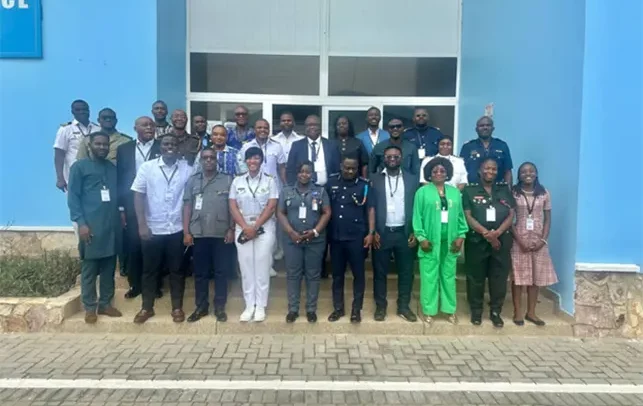The participants in a group photograph
The KOFI ANNAN International Peacekeeping Training Centre has ended a two-week intensive training on maritime security and transnational organised crime for the marine sector.
The training programme, which began on April 28 to May 9, aims to educate security personnel, civilians, and industry players about new developments in maritime security and transnational organised crime, as well as to improve the current coordination, cooperation, and exchange of information among maritime stakeholders.
Courses studied included maritime terrorism, piracy and armed robbery at sea, human trafficking and migrant smuggling, human security management, marine environmental pollution, illegal migration at sea, illegal, unreported, and unregulated fishing, drug trafficking, money laundering, among others.
Speaking at the closing ceremony of the training, the Director of Training at KAIPTC, Col Lawrence Deku, mentioned that the marine sector has economic importance, which is crucial for international trade and the movement of resources.
He stressed that the course has highlighted the complexity of transnational organised crime, such as piracy, and its impact on the economy, which requires shared responsibility for the maritime security sector to deal with the situation.
“The complexity and dynamism of transnational organised crimes, such as piracy, and how they impact maritime security have been highlighted throughout the course,” he stated.
He urged participants to use knowledge gained from their training in their various organisations and improve on collaboration, cooperation, and information sharing to help the maritime security of the Gulf of Guinea region, in order to combat transnational organised crime at sea.
The Deputy Director for Special Projects of the Ghana Navy and class head for the 2025 year group, Lt Cdr Shalom Elorm Yao Morladza, in his valedictorian speech, expressed gratitude to the KAIPTC for the training, noting that the network built over the training will be used to resolve and secure the maritime spaces and dissolve the network that threatens the peace of the marine sector.
Principal Maritime Safety Officer of the Nigerian Maritime Administration and Safety Agency (NIMASA), Lawal Ayodeji Daniel, who doubled as a course participant, mentioned that the training has broadened his knowledge in the maritime sector and looks forward to adopting the new policies to improve the maritime sector in Nigeria.
The training brought together Ghanaians and other African participants from the Gambia, Liberia, the Republic of Congo, and Nigeria within the maritime security sector.
By Florence Asamoah Adom


